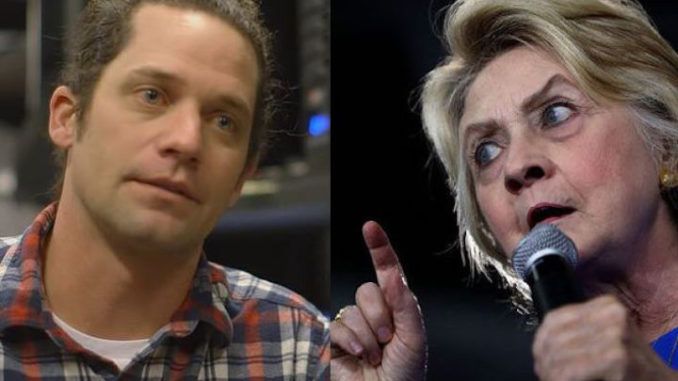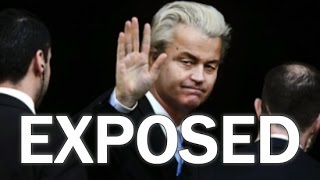
The FBI agent who uncovered incriminating messages that led to the Hillary Clinton email investigation being reopened days before the 2016 election claims senior officials at the bureau instructed him to erase his findings.
John Robertson feared he would be made a ‘scapegoat’ when he found the bombshell emails less than two months the 2016 election, amid the ongoing scandal that Anthony Weiner, whose wife Huma Abedin was Clinton’s top aide, was sending sexual images to a minor.
Robertson watched in horror as the FBI ignored his evidence for a month until he was forced to speak directly with the US Attorney’s office overseeing the case.
Bosses at the FBI ordered him to erase his office computer, which meant erasing the record of his investigations, a new book claims.
Dailymail.co.uk reports: As Robertson put it: ‘To this day don’t understand what the hell went wrong’, the Washington Post reported.
The claims add another layer of intrigue to the investigation of Clinton’s emails which has become one of the most divisive episodes of the 2016 election.
They appear in October Surprise: How the FBI Tried to Save Itself and Crashed an Election, which will be published on September 22 by PublicAffairs.
The book, by Washington Post Justice Department correspondent Devlin Barrett, is said to be a ‘comprehensive, revealing and dramatic look inside the bureau’s role in the 2016 presidential election’.
Central to the account is the investigation into Clinton’s use of a private email server while she was Secretary of State which dogged her campaign and led to an investigation by the department’s Inspector General.
The inquiry was handed over to the FBI and former director James Comey closed it with no criminal charges on July 5, 2016, and rebuked Clinton and her staff for being ‘extremely careless’
But he reopened it on October 28, more than a month after DailyMail.com revealed Weiner’s sexts with a high school girl.
The FBI seized Weiner’s computer and the agent who was tasked with going through it was Robertson – who found yet more Clinton emails.
Comey closed the investigation for a second time on November 6th but by then, Democrats argue, the FBI had handed the election to Donald Trump.
October Surprise reveals Robertson’s frustration and anxiety began to fester in September after he found around 600,000 emails from Abedin including many that were to or from Clinton.
They were on Weiner’s laptop, which he examined in his office at the FBI New York office’s C-20 unit, which is tasked with investigating sex crimes against children.
But he couldn’t examine the messages, even to determine how many were Clinton’s, because the subpoena that was used to seize Weiner’s laptop was too narrow and did not allow it.
Late in September Robertson notified his bosses about his discovery, but after that he heard nothing.
He later told internal investigators: ‘The crickets I was hearing was really making me uncomfortable because something was going to come down.
‘Why isn’t anybody here? Like if I’m the supervisor of any (counterintelligence) squad … and I hear about this, I’m getting on with headquarters and saying ”hey some agent working child porn here may have (Hillary Clinton) emails. Get your a** on the phone, call (the case agent) and get a copy of that drive,” because that’s how it should be.
‘And that nobody reached out to me within, like, that night, I still to this day don’t understand what the hell went wrong’.
Robertson hoped the prosecutors in the Weiner case – Amanda Kramer and Stephanie Lake at the office of the US Attorney for the Southern District of New York – could help him.
He hoped their bosses could ‘kick some of these lazy FBI folks in the butt and get them moving’, the book says.
On October 19 he visited Kramer and told her he was ‘a little scared’
Robertson worried that Comey’s testimony to Congress in July and September that the FBI had just 30,000 emails was now out of date.
Robertson said: ‘I don’t care who wins this election, but this is going to make us look really, really horrible’.
October Surprise says: ‘He had told his bosses about the Clinton emails weeks ago. Nothing had happened.
‘Or rather, the only thing that had happened was his boss had instructed Robertson to erase his computer work station.
‘Ostensibly, that was to ensure there was no classified material on it. But it also meant there was no record of what Robertson had done, or had not done, with the laptop information. He was starting to feel like he was going to be made a scapegoat, and he was freaking out. He had already talked to a lawyer’.
Kramer advised Robertson to become a whistleblower but he chafed at the idea.
The next day Robertson decided to write a ‘Letter To Self’, which he emailed to himself, knowing that if a future investigation were carried out then the email would be found.
He wrote: ‘I have very deep misgivings about the institutional response of the FBI to the congressional investigation into the Hillary Clinton email matter.
‘However, I am not an institutional representative of the FBI. I do not have the authority (or competence, I suppose) to make determinations of this nature.
‘Put simply: I don’t believe the handling of the material I have by the FBI is ethically or morally right’.
Robertson said that notifying his bosses and leaving it at that, as his lawyer advised, was all about ‘CYA’, by which he meant ‘covering your a**’.
That same day Kramer raised the matter with her boss who involved Preet Bharara, who was then the US Attorney for her district.
He spoke with Deputy Attorney General Sally Yates’s office and on October 27, a meeting of top FBI officials was organized for Comey.
October Surprise does not say if Bharara’s actions led to the meeting, or if the FBI finally took note of Robertson’s comments.
During the meeting, Comey asked his then deputy Andrew McCabe to excuse himself from the call due to the scandal over donations given to his wife during her failed run for political office.
Comey told McCabe: ‘I don’t need you on this call’ and he ‘grudgingly’ hung up.
Comey and his aides agreed they needed a search warrant to look at the emails on Weiner’s laptop, which the FBI obtained.
On October 28th – 11 days before the election – Comey told Congress what he had done and sparked a firestorm at the end of a bitterly fought Presidential campaign.
On November 6th – two days before the election – Comey closed the case again when they had been through all the emails and determined that none were new or relevant.
Robertson writes he was ‘elated’ to hear that something was being done but as October Surprise makes clear, a Pandora’s Box had been opened.
Comey was fired by Trump in May 2017 and in his memoir he claims it was because he refused to pledge his loyalty to the President.
He later admitted his language when referring to Clinton was a ‘mistake’.
A highly critical report by the FBI Inspector General found Comey set a ‘dangerous example for the over 35,000 current FBI employees’ in his handling of the Clinton email case.
The report criticized Comey for leaking his private memos of his encounters with Trump to the New York Times and said his colleagues still at the FBI were ‘shocked’ by this.
Trump has repeatedly torn into Comey and claimed it was ‘illegal’ to leak classified information in one of many tweets attacking him.
Special Counsel Robert Mueller investigated whether Trump obstructed justice with his firing of Comey and concluded that he could not exonerate the President, though he did not recommend criminal charges.
Related posts:
Views: 0
 RSS Feed
RSS Feed

















 September 22nd, 2020
September 22nd, 2020  Awake Goy
Awake Goy 


 Posted in
Posted in  Tags:
Tags: 
















